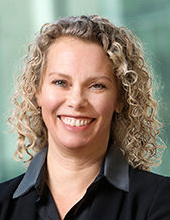Lecture summary: What parts of their uncomfortable histories should universities remember, and how? Recent debates have erupted at institutions of higher learning over their ties to early benefactors who held views antithetical to the values that today’s leading schools espouse. These controversies stir public “memory work” through which learning communities negotiate their relationship to the past. At Berkeley Law, several paintings from Fernando Botero’s Abu Ghraib series controversially adorn a central corridor, reminding viewers of law’s failure to protect against torture in the US War on Terror. The canvasses also serve as a normative rebuke to the Torture Memos which created a new legal framework for interrogation of suspected terrorists after 9/11, and to John Yoo, the Berkeley Law faculty member who wrote them. I argue that the paintings are a form of public memory, a site of communicative interplay between viewers, the paintings, and the debates about the school’s association with Yoo. Understanding the Boteros as public memory places the paintings and the controversy surrounding them into a larger conversation about the responsibility of law schools and educational institutions to inculcate values of respect for human dignity and freedom and to prepare graduates to serve and safeguard these same principles.
 Laurel E. Fletcher is Clinical Professor of Law at UC Berkeley, School of Law where she directs the International Human Rights Law Clinic and the Miller Institute for Global Challenges and the Law. Fletcher has advocated on behalf of victims before international courts and tribunals, and has issued numerous human rights reports. She also has conducted several empirical human rights studies, including of the impact of detention on former detainees who were held in U.S. custody in Afghanistan and Guantanamo Bay, Cuba. In 2009, she and Eric Stover published their results as a book, “The Guantanamo Effect: Exposing the Consequences of U.S. Detention and Interrogation Practices” (UC Press).
Laurel E. Fletcher is Clinical Professor of Law at UC Berkeley, School of Law where she directs the International Human Rights Law Clinic and the Miller Institute for Global Challenges and the Law. Fletcher has advocated on behalf of victims before international courts and tribunals, and has issued numerous human rights reports. She also has conducted several empirical human rights studies, including of the impact of detention on former detainees who were held in U.S. custody in Afghanistan and Guantanamo Bay, Cuba. In 2009, she and Eric Stover published their results as a book, “The Guantanamo Effect: Exposing the Consequences of U.S. Detention and Interrogation Practices” (UC Press).
The Lauterpacht Centre Friday lecture series is kindly supported by Cambridge University Press.
A sandwich lunch is available for all attendees from 12.30 pm in the Old Library.
Numbers are limited so please arrive early to avoid disappointment. Please note the lecture programme is subject to revision without notice.
An audio recording of this lecture is available on the University's Streaming Media Service
A list of all recorded events and lectures at the Lauterpacht Centre can be viewed in on this website in Media/Audio recordings.


 Facebook
Facebook  Twitter
Twitter  Instagram
Instagram  YouTube
YouTube  Flickr
Flickr  LinkedIn
LinkedIn